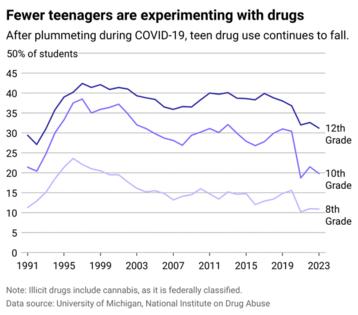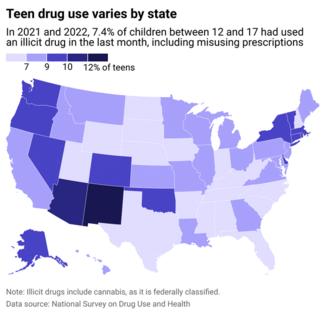How teen drug use compares by state
Published in Slideshow World
Subscribe
How teen drug use compares by state
Fewer teenagers are using drugs after rates precipitously dropped during the COVID-19 pandemic, but overdose rates are on the rise as fentanyl becomes more common.
Substance Use Treatment Facilities examined data from the University of Michigan's Monitoring the Future survey and the Substance Abuse and Mental Health Services Administration to determine how teen drug use varies by state and how it has changed over time.
In 2023, about 1 in 5 children between the ages of 12 and 17 had used an illicit drug in the past year, down from about 28% of teens in 2020, according to the University of Michigan's annual Monitoring the Future survey. The report, which is sponsored by the National Institute on Drug Abuse, surveyed more than 22,000 students in the eighth, 10th, and 12th grades.
The steep decline can partially be attributed to school closures during the pandemic, which limited access to drugs, while parental supervision increased due to work-from-home orders. After a slight rebound in 2021, alcohol, nicotine, and cannabis use has largely continued to decline across all grades and remains substantially lower than pre-pandemic levels.
Among 12th graders, prescription misuse has also decreased, falling from 8% in 2020 to 4% in 2023. Still, it remains the most common form of drug abuse after alcohol and marijuana, and while opioid overdose rates are dropping overall, they're rising among teens. A 2024 report published in the New England Journal of Medicine found that drug overdoses have become the third-leading cause of pediatric deaths after gun-related injuries and car crashes, largely due to an increase in the use of fentanyl in counterfeit pills.
Visit thestacker.com for similar lists and stories.
Teen drug use on the decline
Teens turn to drugs for multiple reasons, including to relieve boredom, to feel like an adult, or to fit in. It can also be a sign of mental illness, as drugs can be used as a form of self-medication for conditions such as depression, anxiety, and ADHD.
After peaking in the mid-'90s, teen drug use has largely been on the decline. This has partially been attributed to increased anti-drug messaging, including the war on drugs policy in the late 1980s and the proliferation of national drug education campaigns like D.A.R.E.
After dropping during the pandemic, researchers had speculated teen drug use could rebound once students returned to school. However, the latest data shows a delay in first-time drug use among younger students has led to lower levels of chronic drug use overall. In other words, since fewer students experimented with drugs for the first time, it reduced their chances of using them again.
In 2023, the share of 10th graders who had never tried drugs or alcohol rose to 54% from 49% the year before. For 12th graders, the increase was even more significant—38% had abstained from drugs in 2023, up from 31% in 2022.
Teens in New Mexico, Arizona more likely to use drugs
While teen drug use has largely declined, the latest data from the National Surveys on Drug Use and Health shows moderate differences by state.
Drug use is generally higher in some Western states, including New Mexico, where 13.7% of teens had used drugs in the past month. This is in line with larger trends, as New Mexico has had some of the highest rates of alcohol and drug-related deaths in the country for decades. A 2023 report from the state's legislature found fewer teens are using drugs than they were a decade ago, but overdoses are on the rise.
Northeastern states including Rhode Island and Massachusetts also have some of the highest rates of teen drug use. Again, this is in line with larger regional trends, as New England has felt the outsized impact of the opioid crisis.
States with the lowest rates of teen drug use were Alabama and Utah, with both at around 5%. However, both states have experienced a rise in opioid deaths in recent years. In 2023, Alabama launched the Odds Are Alabama campaign to raise awareness and prevent fentanyl-related overdose deaths.
Story editing by Cynthia Rebolledo. Additional editing by Kelly Glass and Elisa Huang. Copy editing by Tim Bruns.
This story originally appeared on Substance Use Treatment Facilities and was produced and distributed in partnership with Stacker Studio.









Comments